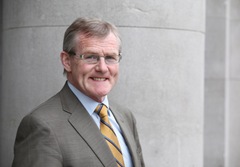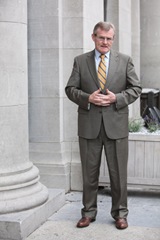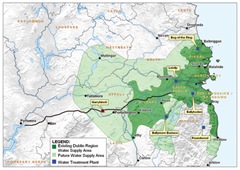A new contract with nature: Gabriel D’Arcy
 Gabriel D’Arcy, Managing Director of Bord na Móna, tells Owen McQuade about the company’s capacity for diversification and its belief that it is qualified to become the state’s new water utility.
Gabriel D’Arcy, Managing Director of Bord na Móna, tells Owen McQuade about the company’s capacity for diversification and its belief that it is qualified to become the state’s new water utility.
In recent years Bord na Móna has produced a “very credible, gritty performance”, recording a minimum increase in earnings of 12.5 per cent in each of the last five years, whilst diversifying from peat production to more sustainable business ventures.
Peat now accounts for less than 50 per cent of the company’s revenue. The four main areas of future business are:
Renewable energy: Wind energy and biomass (the company is currently co- fuelling its peat station at Edenderry with biomass);
Resource recovery: Waste collection and diversion from landfill, waste to energy and composting.
Environmental: Developing products and systems that create clean air and water, including wastewater treatment and rainwater harvesting systems;
Retail businesses: Supplying peat and biomass diluted products to retail markets in Ireland the UK and internationally.
Since he became Chief Executive in February 2008 D’Arcy’s main focus has been on driving earnings growth in and across these businesses. “That’s about being competitive and getting our cost base right, particularly when we are exporting so much into the UK market,” he states. Bord na Móna is “the largest single (by volume) exporting company out of the country [and] most people don’t realise that,” he adds.
Sustainability
Competitiveness, innovation and sustainability are “key” to driving earnings growth, D’Arcy contends. The company’s vision, as it moves away from its 75-year history of peat production, is of ‘a new contract with nature.’
“Its underlining concept is sustainability,” D’Arcy states. However, he contends that “there’s no point in being environmentally sustainable if you’re not economically unsustainable.” Therefore the new contract with nature incorporates environmental, economic and social sustainability. “There’s the environmental element but there’s also an economic element to this and there’s social sustainability: the people we employ, the communities that we serve,” he explains.
The adoption of a new vision has begun “to shape the destiny of Bord na Móna,” D’Arcy contends. The company has concluded that the continuation of cutting peat from their bogs “is not environmentally sustainable from an ecological point of view, from a carbon point of view and [that] it’s much more valuable from a national point of view to leave the bogs intact.” In making the move away from peat, Bord na Móna examined “the key skills that we’ve got and some of the key needs of the country going forward.” D’Arcy concludes that Bord na Móna’s strengths lie in wind and water.
Its 2010-2011 sustainability report states that as a public limited company, Bord na Móna’s core remit of creating shareholder value will be fulfilled through the achievement of sustainable business objectives such as becoming the leading renewable energy generator, providing approximately 500MW of wind, biomass and other renewable energy supply capacity by 2015; to roll out clean air and clean water technologies and to double the size of the business by 2016; and to become Ireland’s leading water capture, storage, treatment and distribution company.
“We were the first company in Ireland to build, own and operate a commercial wind farm. We still own that 6.45MW farm at Bellacorick County Mayo,” D’Arcy states.
In addition, the organisation has “the longest line of clean wind data of any company in the British Isles going back to 1990.”
Two more wind farms are expected to be commenced in the midlands in 2012; 30 turbines with a capacity of 80MW at Mount Lucas, County Offaly, and 16 turbines with a capacity of 40MW at Bruckana on the borders of counties Tipperary, Kilkenny and Laois.
“I think there’s real opportunity here,” D’Arcy states. In addition, Bord na Móna has established a joint venture with ESB to build out the first 100MW of the 360 MW planned wind farm in Oweninny County Mayo.
“It’s an exciting time in Bord na Móna because our contract with nature and our focus on sustainability is playing to our strengths and to the nation’s strengths,” he sums up.
D’Arcy believes that Ireland’s “unique, differential, leveragable strengths” that Britain, France, China and India don’t have, are “copious amounts of renewable energy opportunities in terms of wind, biomass and wave.” He also contends that “as time moves on, water is becoming the scarcest resource on the planet.”
Water
Contextualising the importance of water to Ireland, D’Arcy points out that 25 per cent of the water usage in County Kildare is attributed to the Intel campus in Leixlip. Attempts are being made to establish other major multinational businesses in the midlands where “the biggest constraint is not the educated workforce, corporation tax [or] access to the euro zone, but water,” according to D’Arcy.
He suggests that “water is going to be one the greatest opportunities for foreign and direct investment” and that it is a key tool which is “as important, if not more important than corporation tax.”
Following meetings with local communities in the Shannon region, who wanted to know if Bord na Móna could help alleviate the flooding in the area, D’Arcy recognised the potential for the company in terms of water system management.
Bord na Móna is currently negotiating with Dublin City Council on the ‘Water Supply Project, Dublin Region’ which would see the creation of a new water reservoir that would take water at peak flow from the River Shannon to provide drinking water for Dublin, Westmeath, Offaly, Laois, Kildare and Meath. Under the plan, water would be stored in Garryhinch cutaway bog near Portarlington, County Laois, in a reservoir which will cover over 700 acres. Bord na Móna, which owns the bog, would build the reservoir where the water would be treated before being transported by pipe to the capital and the surrounding regions. If it gets planning approval, it is anticipated that the project could create up to 1,000 jobs during the construction phase. It would also create a natural amenity that could be used for water sports, fishing, sailing, walking and bird watching.
The proposed project came into being when Bord na Móna had begun discussions with Offaly County Council as to whether it would support them using their cutaway peatlands to relieve flooding in the Shannon basin. Simultaneously, the Department of the Environment and Dublin City Council commissioned a “fairly exhaustive study” using RPS consultants into the Water Supply Project. He explains that the next stage will be a detailed consultation with local communities, interest groups and “a much more detailed environmental impact assessment.”
Water utility
A “related opportunity” for Bord na Móna is the Programme for Government’s stipulation that the new Government would create Irish Water, a new state company that will take over
the water investment maintenance programmes of the 34 existing local authorities.
“On top of that,” D’Arcy adds, “one of the conditions of the EU-IMF bailout was that there would be a study in the water provisioning services in Ireland with a view of coming up with a much more sustainable model.”
Consultants appointed to investigate the creation of Irish Water have to report back by October, which highlights the importance of the measure. If the consultants conclude that Irish Water is a necessity, an existing company would be preferential to the creation of a new one, D’Arcy believes.
“Are we going to set up a new company and populate it with new management, a governance structure, a financial model etc?” In deciding this, the Government must ask itself ‘what capabilities do we want this organisation to have?’
Ultimately, D’Arcy contends that the Government will want a company that has “a track record in managing diverse multi-site businesses, a good commercial track record, a strong technical project management and delivery capability (for example in water and waste water management), international experience in raising capital, ownership of the land which is going to be employed for some of the key projects and, most importantly, has a solid reputation still intact in 2011.”
In this context, D’Arcy sees Bord na Móna as the most obvious choice. “If you stand back and look at how Bord na Móna goes about its business, in terms of its capability to change and re-invent itself, its track record of strong financial performance and its vision for the future in terms of its new contract with nature, it ticks most, if not all of those boxes,” he contends.
He concludes: “I would be proffering to the consultants and to the department that Bord na Móna is a ready and willing partner to serve in this development as the Minister of the Environment so wishes. It’s appropriate as a state-owned enterprise that we should be doing this.”
Garryhinch, County Offaly, is a 1,450 acre well-drained cutaway bog. The Bord na Móna proposal is to incorporate a reservoir, eco park, treatment plant and wind farm on the site, in a project with capital costs of approximately €500 million. Adjacent to Garryhinch is the 700 acre Garrymore bog in County Laois, currently in production. Long-term, Garrymore has the capacity to be incorporated as an expanded storage facility.
Profile: Gabriel D’Arcy
Gabriel D’Arcy is Managing Director of Bord na Móna. The third oldest in a family of 10 from Ballinamore, County Leitrim, he was educated at Garbally College, Ballinasloe. He holds a BSc(Hons) from University College Galway, an MSc from University College Dublin, an MBA from Kingston University Business School, an advanced diploma in management practice from University of Ulster and an Institute of Directors’
diploma in company direction. He is a member of the Institute of Directors and a member of the Board of the Institute of Public Administration.
D’Arcy previously served as a captain in the Defence Forces. In 1989 he decided to leave and follow his interest in food science. He took up a position in Kerry Group where he “worked closely with great leaders and got an insight to building business in Europe,” finding it “very exciting.”
Under Denis Brosnan he learned “the power of leading from the front as opposed to leading from the rear.” He sums up that “for leadership you need energy, vision, commitment, determination and getting insights into what is happening; you don’t get that back in headquarters on top of a hierarchy being fed reports by your subordinates. You get that from being out there and then bringing that insight into your decision-making.”
He is married with four children and lives in Terenure, Dublin where, in his spare time, he coaches mini-rugby at Terenure College Rugby Football Club.







